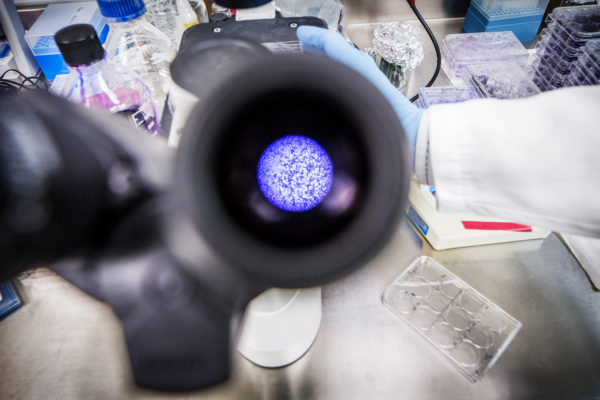INRS is involved in numerous strategic research and training partnerships at the national and international levels in collaboration with industry and with public and community organizations. Whether you want to access cutting-edge facilities, acquire state-of-the-art technology, or take advantage of our expertise, INRS is a well-established research partner with over 50 years of experience!
Did you know that there are many funding programs for university–industry partnerships in Quebec and Canada? Partnership research has several advantages. Sometimes initiated to meet the needs of a specific project, it can also lead to successful, long-term partnerships. Research partnerships take various forms. They provide access to expertise and dedicated research teams, cutting-edge facilities and equipment, and a wealth of resources to help you achieve your goals. Partnership research is also an opportunity for our graduate students to learn and innovate while tackling real-world problems and to further their knowledge of emerging issues and social developments.
Partnership research: a strategic solution
With INRS, you get access to our scientific community’s extensive international network and a support team dedicated to research development and knowledge transfer. Various funding programs promote research partnerships with academic institutions, and businesses and organizations receive tax incentives for research and development. Contact us (French webpage) for support throughout the technology transfer process.
INRS is involved in numerous strategic research and training partnerships at the national and international levels in collaboration with industry and with public and community organizations.
Submit a research project
Our partnership and commercialization advisors (Bureau des partenariats et de la valorisation) can help direct you to the right resources and funding opportunities. You can also directly contact a faculty member with the expertise you seek to lay the foundations for collaboration, be It for a specific research contract or a long-term project.
Get access to research facilities
Our state-of-the-art specialized laboratories and world-class facilities are catalysts for scientific and technological innovation. INRS is home to over X research facilities available to partners for collaborations, research contracts, and services. See the list of available facilities and services
Acquire technology
INRS has technologies and applications ready to be developed into new products, services, and processes. Discover the innovations at your disposal! Contact us (French website) for support throughout the technology transfer process.
Work with up-and-coming specialists
Many of our students are actively involved in partner research as part of their graduate programs. Research partnerships are a great way for businesses and public and community organizations to interact with future graduates with expertise in their fields of interest. Your company can also take on an intern under the PERSWADE or TEDGIEER university—industry training programs. They are a great way to groom promising young talent for the future.
Support research
Whether through the creation of a dedicated research chair or one-time or regular donations, financial support is essential for maintaining research activities, training the next generation of high-level scientists, and acquiring the equipment needed to make new discoveries. Would you like to support research? Find out how you can help.
Research funding with the partnership with the Quebec industry
Improvement of Quebec City’s water supply system
NSERC has awarded INRS a three-year $120,000 grant to study the structural deterioration of drinking water supply systems and how best to deal with it, in collaboration with the City of Quebec. INRS has a state-of-the-art hydraulics lab for water supply systems at the Québec Metro High Tech Park.
Bioplastics in bioreactors
At INRS’s Environmental Biotechnology Laboratory, Bosk is using three 2,000 L bioreactors linked by a network of metal pipes to test its bioplastic production process before building a larger-scale plant in 2020. Its flagship product is PHA (polyhydroxyalkanoate), a bacterial polymer that is an excellent substitute for many conventional plastics.
MÉTOX: From process creation to commercial deployment
Commercialization of INRS’s MÉTOX® process has made it possible to test a contaminated soil treatment process at the Pointe-aux-Lièvres site in order to resolve certain problems identified by the City of Quebec, in particular soil contaminated by incineration ashes. Métox’s technological innovations are the result of a process developed by INRS and used under licence.
SIGMA Devtech Inc. is commercializing an environmental technology to reduce CO2 emissions
INRS has developed a low-carbon method of producing magnesium oxide from mine tailings. SIGMA Devtech Inc. has been granted an exclusive commercial licence to the technology, which uses serpentine ore (widely available in Quebec) and industrial CO2 emissions to produce high-purity magnesium oxide. Magnesium oxide has many applications ranging from animal feed to steel production.
Creation of the Mikinakw Community Wellness and Healing Circle
To prevent violence against Indigenous women and support families, the , INRS, and various other partners are working together to develop a new model for community healing. The project has received $1 million in funding from the Department for Women and Gender Equality.
REPERE: State-of-the-art university facilities available to SMEs
The Infrastructure of Nanostructures and Femtoscience at INRS is one of the seven technology platforms making up the REPERE network, a Prima Québec initiative that allows companies using advanced materials to access cutting-edge equipment and related expertise.
PERSWADE and TEEDGIEER: Industry-oriented programs
Resulting from a close collaboration between academia and industry, the training program and the PERSWADE wireless systems program bring together universities and industrial collaborators to train qualified individuals in the sustainable management of urban, agricultural, and industrial waste and in the field of wireless networks and systems and their smart applications. These interdisciplinary programs have each received over $1.6 million in NSERC funding.









